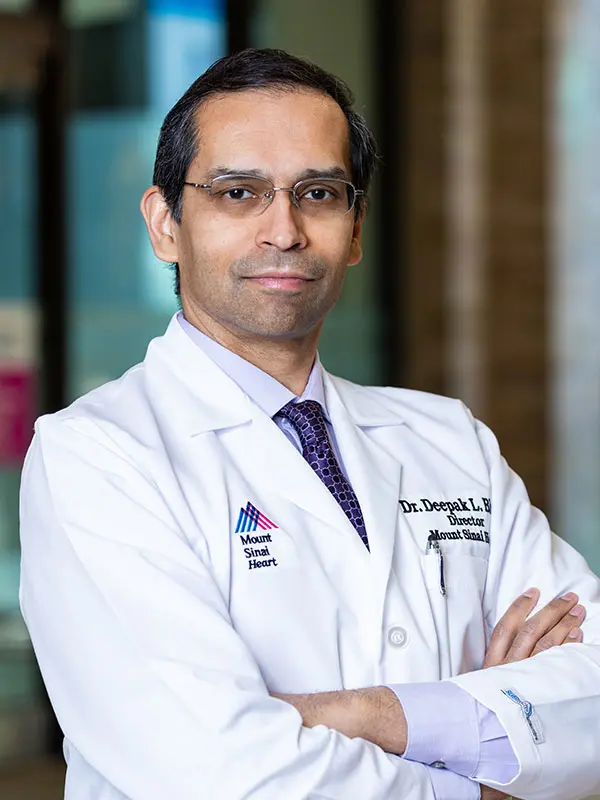As the one of the world’s foremost institutions in cardiology, cardiac surgery, and research, Mount Sinai Fuster Heart Hospital is a renowned destination for trainees who not only want to learn from the best, but also join their ranks.
“We have some of the field's leading faculty in terms of both clinical care and research,” says Deepak L. Bhatt, MD, MPH, MBA, Director of Mount Sinai Fuster Heart Hospital and the Dr. Valentin Fuster Professor of Cardiovascular Medicine at the Icahn School of Medicine at Mount Sinai.
“We have faculty who are leading or who have led professional societies, such as the Society for Cardiovascular Angiography and Interventions and the American College of Cardiology,” he adds. “We had four faculty members present on late-breaking clinical trials at the 2025 American College of Cardiology. In terms of cardiovascular disease, we are really leading on all fronts.”
Mount Sinai Fuster Heart Hospital at The Mount Sinai Hospital is ranked No. 4 in the nation for Cardiology, Heart & Vascular Surgery by U.S. News & World Report® for 2024-25, and it is ranked the top hospital in New York State on Newsweek/Statista’s “World’s Best Hospitals” list for 2025, achieving that honor for the third straight year.
“The volume of cases is enormous, and our trainees’ experience is the product of volume times complexity.”
The program is led by Jonathan L. Halperin, MD, Vice Chair of Education for Cardiology and fellowship Program Director. Its breadth of expertise is one of many factors that make The Mount Sinai Hospital’s Cardiovascular Disease Fellowship among the most advanced training programs nationwide. The program has consistently set standards in cardiac practice and cardiovascular research, and trainees have the opportunity to treat an extraordinarily wide range of patients.
“The volume of cases is enormous, and our trainees’ experience is the product of volume times complexity,” Dr. Bhatt says. “We have a lot of patients and a lot of complex patients. That makes the perfect environment for someone who is in training, because they see a lot of the common cases, but they also see a lot of the rare cases, which you don't always get, even at large urban medical centers.”
The three-year fellowship, based at The Mount Sinai Hospital on the Upper East Side of Manhattan, accepts six general cardiology fellows each year. The goal is to discover and enhance the talent and interests of each trainee, preparing them for careers in academia. From the outset, they are engaged in patient care, contributing to decisions in disease management so that they build expertise and confidence in their ability to achieve successful outcomes. They also have opportunities to diversify and deepen their knowledge through advanced fellowships in subspecialties such as interventional cardiology, congenital heart disease, electrophysiology, heart failure, prevention, vascular medicine, and cardiac imaging.
Trainees further benefit from the fellowship’s mentorship program, which matches them with faculty based on their area of interest, as well as access to international experts in cardiovascular disease through the fellowship’s visiting professor program. “Our fellows get to spend the better part of a day with the visiting faculty,” Dr. Bhatt says. “That is an opportunity for them to network and to get advice from really experienced and well-known third parties.”
The fellowship continues to evolve to ensure that trainees graduate ready to excel in and advance the field. Dr. Bhatt says the program is training fellows in the application of artificial intelligence (AI) tools to enhance patient care and gain new insights on cardiovascular disease. Fellows are learning how to use AI in interpreting patient electrocardiograms and echocardiograms. They are also exploring the potential of AI to advance research through participation in clinical trials such as TRANSFORM. This multicenter randomized trial, led by Dr. Bhatt, is investigating the efficacy of combining an investigational AI-enabled algorithm with coronary CT angiography in the staging of plaque build-up in the arteries of patients before they experience a heart attack, versus standard of care.
“Essentially, we are trying to establish something similar to a mammogram or a colonoscopy for coronary artery disease screening,” Dr. Bhatt says. “Our fellows are often on the front lines of care, which means they are well positioned to identify patients for clinical trials like this.”
Looking ahead, within the next two years, the fellowship plans to introduce a research track so that fellows can devote a year to research in their area of interest. The hope, Dr. Bhatt says, is that their work will advance the field, but the real objective is to help advance the career of trainees.
“By giving them that extra time to get published and learn the skills to write grants, we can make them more competitive,” he says. “When they start their jobs the following year, they can hit the ground running as independently funded investigators.”
Learn more about the Cardiovascular Disease Fellowship at The Mount Sinai Hospital.
Read about Mount Sinai Fuster Heart Hospital in the 2025 Specialty Report.
Featured

Deepak L. Bhatt, MD, MPH, MBA
Director of the Mount Sinai Fuster Heart Hospital, and the Dr. Valentin Fuster Professor of Cardiovascular Medicine

Jonathan L. Halperin, MD
Vice Chair of Education for Cardiology, and the Robert and Harriet Heilbrunn Professor of Medicine (Cardiology)